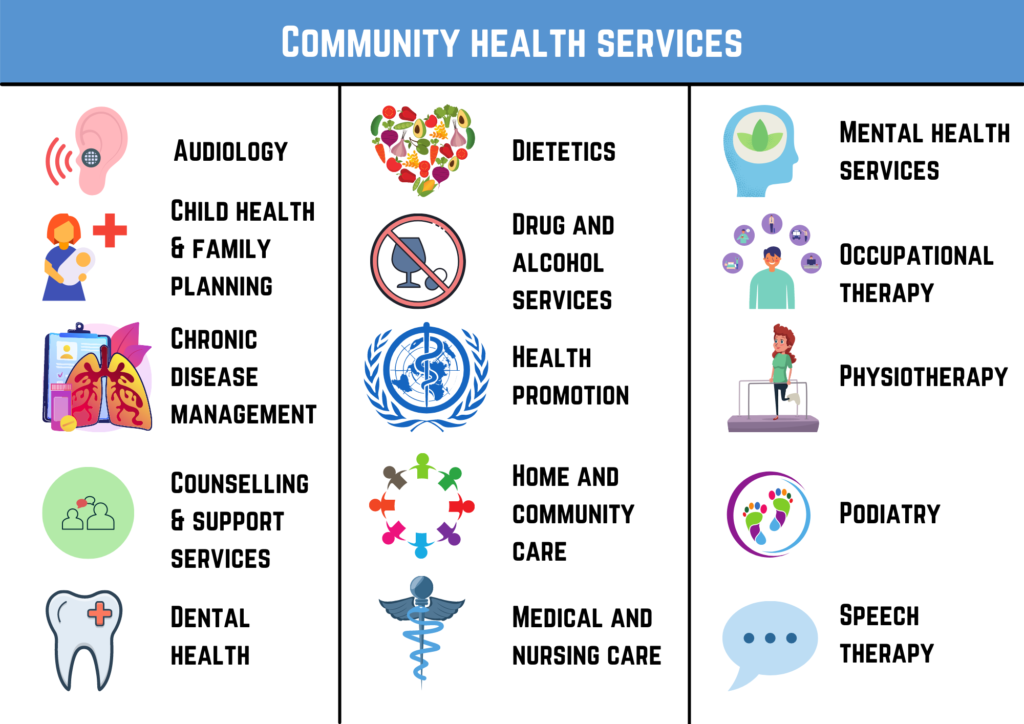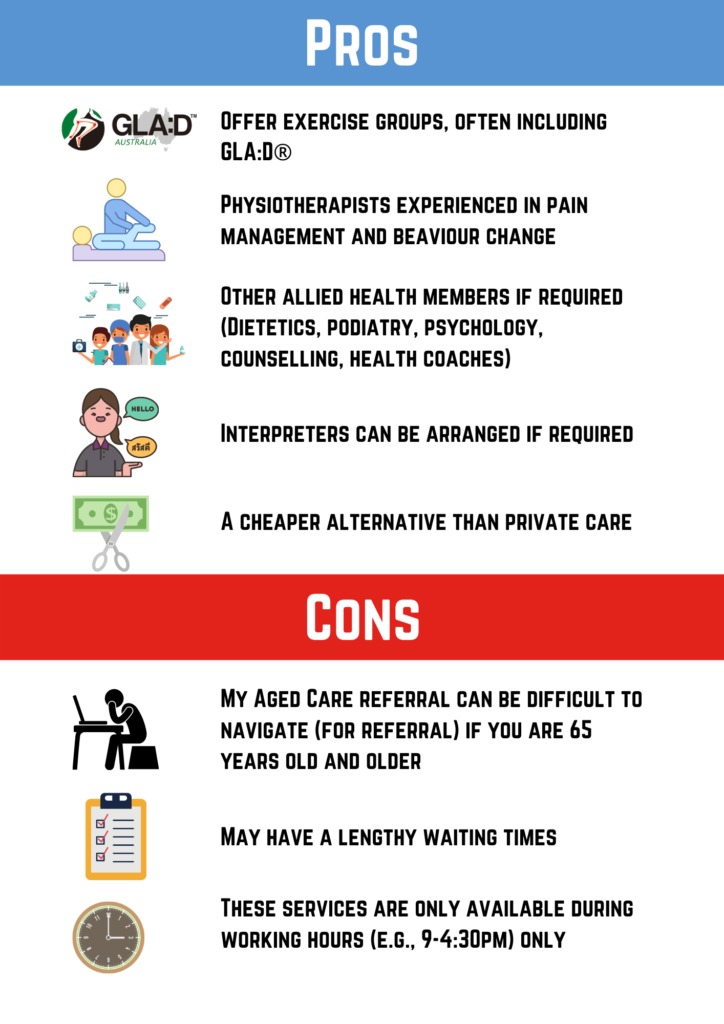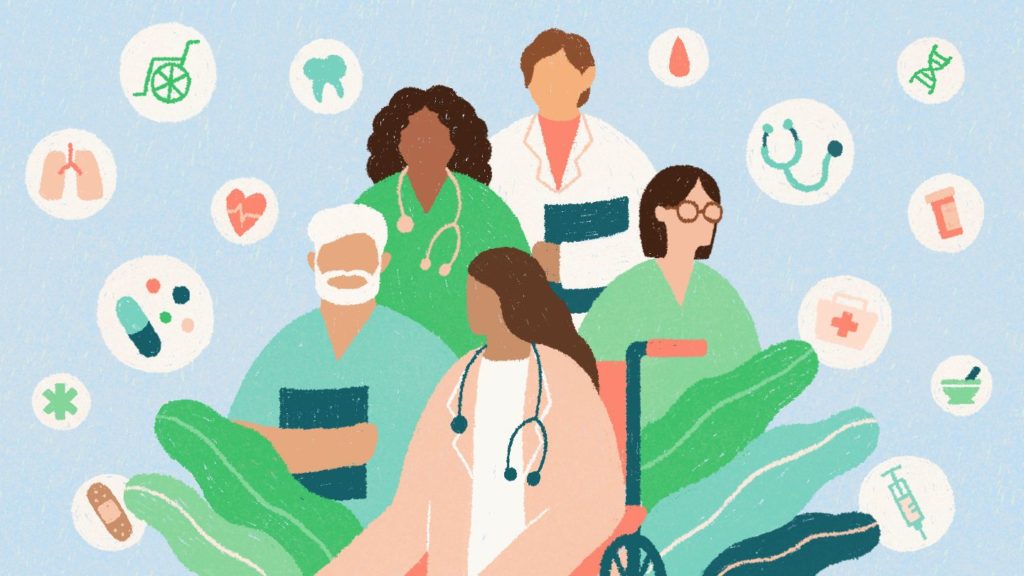Community health centres are clinics (in Victoria only) that offer a range of healthcare services to the local residents that focuses on health promotions, disease prevention and disease management. There is a variety of programs and healthcare professionals that work within these services that may help you live a fuller life despite having knee osteoarthritis. This page was designed for you to have a better knowledge of community health services, what they provide, and whether it is suitable for you.
As mentioned above, community health centres are found in Victoria only (for Australia) and offer a range of healthcare services to the local residents that focuses on health promotions, disease preventions and disease management. They receive their funding from the commonwealth and state government, however they are also able to consult individuals with Medicare Benefit Scheme (MBS) funding or those who want to pay privately.
Some community health centres are affiliated with hospital networks, while others are independent not-for-profit organisations.
The services provided by community health varies, but it may include:

There are more services that are provided than the list provided above. For the full list of services that your community health centres may provide click here
Community health centres often have the GLA:D® program, physiotherapists (experienced in pain management and behaviour change), dietetics, podiatrists, psychologists, counsellors and health coaches. These programs and clinicians may be available to help you with your knee osteoarthritis and your situation.
- The GLA:D® program is an education and exercise service that is 12 sessions in length (each session is about 60 minutes). The sessions are often run by a GLA:D® trained physiotherapist. It has been shown to reduce pain by 36%, reduce the use of pain medication, reduce the perception of need for surgery and have clinically meaningful improvement in joint confidence. For more information, visit the GLA:D® website.
- Physiotherapists may be able to help and guide you in how to start increasing your physical activity. They can also help you find suitable exercises that fits into your life with the goal of reducing your arthritis symptoms and increasing your functional capacity. They can also help you learn more about knee osteoarthritis and provide advice on what to do when your symptoms flare-up. To learn more about what exercise can do for your arthritic knee click here.
- Dietitians may be able to educate and assist you in weight loss and/or weight management. Just a 5% reduction in body weight can significantly improve your arthritis symptoms and general health. To learn more about what weight management can do for your knee click here.
- Podiatrists may be able to guide you to find the right orthoses or footwear that can help manage your knee osteoarthritis. For more information about shoes, footwear and knee osteoarthritis click here.
- Psychologists and counsellors may be able to help you in navigating through some beliefs you may have about knee osteoarthritis. Unfortunately, psychological and lifestyle factors such as having high stress level, having anxiety or depression influence the level of pain an individual with knee osteoarthritis might experience. Psychologists and counsellors will be able to help you navigate through these factors.
The cost of these services varies depending on the care you are receiving and your ability to pay.
On average, an individual who is on average income may be charged $10-15 per session.
Pensioners are often charged $10 per session.
Healthcare card holders are charged a discounted fee.
If you are interested but the cost is a barrier to you participating, call and speak to your nearest community health centre to find out more about payment options they may be able to offer.
Community health services are available to all Victorian residents.
However, priority access are given to disadvantaged populations with the poorest health and the greatest economic and social needs.
To access community health services, you can simply refer yourself by contacting the community health centre.
Alternatively, your GP, an OAHKS (Osteoarthritis hip and knee service) clinician, or other health professionals that you may already be involved with can send a referral to the community health centre of your choosing.
If you are under 65 years old, it is the simple process that’s already described/.
If you are 65 years old or over, you need to complete the referral through My Aged Care. My Aged Care is an Australian government funded service aimed at assessing what the older population of Australia may need to ensure they have a well-rounded care. For more information about My Aged Care click here or visit the My Aged Care website
There are a lot of great things about community health services, however there are also considerations that you must take to see whether these services are suitable for you. The list below are some of the pros and cons of community health services

That’s great!
To find the closest community health centre, visit the Department of Health’s community health directory by clicking here.
It is a good idea to contact them and enquire about whether they provide the service that you think you might benefit from. as different centres provide different services.
Resources
Next – My Aged Care
